Tell
Me More:
click here if you would like to know more about the subscription,
or get an overview of The Goldenbar Report.
:
click here if you would like to go directly to the subscription
form, and begin reading this week's entire issue right
away.
Read
on if you would like to think about it.
| Topics
in this week's issue of the Global Investment Climate |
|
•>
|
Why
is the gold lease rate contango inverted and what
pressure cookers lurk beyond? |
|
•>
|
The
concept of value investing, applied to the current
investment climate, and revisited through a trip
down memory lane. |
|
•>
|
A
discussion of the egomaniacs that are driving interest
rate policy outside of the parameters set by the
FOMC. |
|
•>
|
Can
there be deflation in the United States? Inflation
versus Deflation argument update. |
|
•>
|
Rising
credit market spreads (risk premiums) + rising national
default rates = critical erosion in dollar fundamentals |
|
•>
|
The
nearby direction of the Dollar will be down as consumption
peters out again... and it will take the bond with
it... could the dollar withstand a zero interest
rate policy? |
|
•>
|
How
do recent changes implemented by the Bagel Committee
affect the dollar? |
|
•>
|
Should
we buy February's best performing stock sector? |
Ready…
Set… Go…
Personally, I have been bullish on gold prices ever since
the Bank of England announced that it would sell most
of its remaining gold, in the spring of 1999. One reason
is that while the announcement sent gold prices down to
the $250 handle, the sell off wasn't panicky, in nature.
There was volume, but it wasn't a long liquidation. There
weren't enough (gold) bulls around even then for the announcement
to set off a panic.
It
was more like the very last gasp of air that a dead bull
might snort, just before he keeled over at the hands of
his bullfighter…
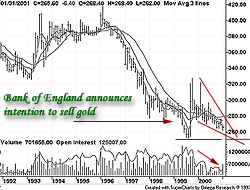 |
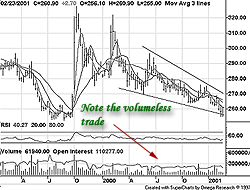 |
| 10
year gold prices:BOE announcement |
2
year gold prices:Nine month wedge? |
Within
five months, in any case, we were ready to discover why
the Bank of England chose to slam the gold market… the
major European banks had already sold or leased too much
of their gold, and had finally agreed to stop the risky
practice by signing the now historic Washington Agreement
at month end, September 1999. Though the agreement was
downplayed for its significance, perhaps it was necessary
if only because the banks did not trust each other to
keep to a verbal agreement (maybe even having already
failed at that). Is that an idle thought?
Anyhow,
with the benefit of hindsight, may we propose that it
was helpful to the European banks (the signatories) for
the Bank of England to stand on top of the corpse and
squeeze every last ounce of life out of it (the market)
first? This way, the reversal could take place from a
lower price level, allowing two obvious advantages: first
it would soften the net financial punishment that the
market was ready to deliver in October - upon hearing
of the agreement - and second, not unrelated, it would
allow the European banks some time to prepare and cull
their portfolios a little. In our opinion, this basic
scenario is far too plausible to dismiss.
Consequently,
maybe it is "not" all that ironic that lurking
in the background recently has been the rumor of news
that the Bank of England is short physical gold supply
with which to settle on its post auction delivery notices...
The
view has been offered (by many blue chip analysts…) that
the psychological impact of the news that a prestigious
central bank cared nothing for its gold holdings, at the
time, vastly outweighed the potential market impact of
the relatively small amount of gold it held and planned
to sell, were it done quietly. But the Bank dismisses
this key point as misguided criticism, proposing rather
that they broadcast their intentions precisely because
they did not want to scare the market. Huh?
You
can say that again…
Anyhow, nothing ever happens unless there is a reason
for it, right? Of course, we have no proof. We haven't
the resources to obtain it. But we can assure you that
there are very few speculators or investors who have any
more than half the truth at any given point in time… maybe
even less than that today.
The
reality is that the Bank of England's move was out of
place and out of character. It did not reconcile with
the view that the European banks shared about gold officially,
and it stood entirely against the American position on
gold. Folks, this is not conspiracy, it is strategy. We
cannot expect that if there exists a potential systemic
risk in capital markets large enough that it could crush
the global banking system, were it to crystallize, that
politicians would tell us all about it. It just does not
stand to reason.
More
to the point here, adopting our view, it suddenly becomes
easy to explain the rise in lease rates prior to the signing
of the Washington Agreement, which seemed to puzzle the
esteemed Dr. Jessica Cross in her report on the gold derivatives
crisis, one year later.
Right,
here we go then… those bankers in the know spent the summer
unwinding some of their more perilously speculative positions.
Who wouldn't? Perhaps, some of the smarter ones had also
decided to hoard some physical gold supply, without detection,
and maybe even bid for it at the Bank of England's own
gold auctions throughout that summer. Ok, if not, how
else does one explain the rise in lease rates?
Traders
have been trained to anticipate large bullion sales on
the rising lease rates. One reason is that it has been
traditionally customary for a borrower to sell the gold
right away if it was borrowed as a source of financing.
The other reason is that when a central bank would sell
its gold, it would draw it from the leasing pool to do
it.
Yet
neither occurred. Rather, there was a nearly obvious accumulation
on the charts, at the $250 handle. Well then, somebody
must have been accumulating physical gold supply. I suppose
it could have been anyone, but consider that such a move
might enable the said bankers to contain the post Washington
Agreement gold market by supplying the lending pool in
order to hold lease rates down and persuade us that there
is plenty of supply. Sound familiar?
Yet
that conclusion is way too controversial to make about
her own clients and business associates, and evidently
further removed from reality than the idea, proposed by
Cross, that the higher lease rates were deliberated by
said bankers to generate a little more profit for themselves.
Hah! No kidding, that kind of guessing is allowed because
it pleases the Queen that her bankers seek to profit in
the name of capitalism. The greater insidious truth is
that they do it at the expense of capitalism. The critic
of our argument might suggest that the lending pool is
far too large to lend itself (no pun intended there) to
manipulation with such a small quantity of physical gold
as could be bought without detection in five months. This
critic should read on…
Contango-i-tis
How important are lease rates anyway? According to Dr.
Cross, writing for the World Gold Council on the subject
of gold derivatives and lending, "the widespread
use of derivatives has generated a growing need for
lent gold and the concept of participating in the
leasing market has been actively marketed (?) to the official
sector by the commercial banks."
Since
the widespread use of derivatives has grown ever wider
since the Washington Agreement was signed, lending markets
must have become ever more crucial to the life blood of
the contemporary banking system, and lease rates ever
more indicative, of something.
But
what lending market? According to Jessica Cross, again,
"The extent to which the Washington Agreement
has effectively sterilized a very large proportion of
potential new lending is all too apparent… Should this
be the case, the total potential liquidity, post the Washington
Agreement, now stands at between 560 and 1000 tons. This
compares with figures of over 6000 to over 9000 tons prior
to the announcement."
In
other words, the regular flow of gold into the lending
pool has withered by almost 90%, as a result of the agreement.
Well… if this tap has been all but shut off, shouldn't
lease rates have risen after the Washington Agreement?
Maybe that is what is happening right now. The delayed
reaction may be the consequence of two things: First,
demand from traditional gold borrowers undoubtedly declined
by roughly the same quantity as the new supply, after
witnessing what could happen to entire companies who owed
the volatile metal. Second, whatever borrowers remained,
largely rolled their borrowings right up the maturity
contango… meaning that they extended their maturities
beyond one year, for a little temporary safety. Another
observation made by the Doctor (PhD) in her own report…
quoting anonymous banking sources of course.
So
if borrowers are borrowing longer term now than one year,
that alone probably imparts a slight net drain on the
availability of short-term physical gold supply. Moreover,
if the currency volatility continues, duh, as if the international
currency regime would all of a sudden become stable, then
it is increasingly unlikely that the smaller players,
like Turkey or India, will be all too willing to join
loyal Kuwait in lending their official gold reserves to
the hungry tentacles of a giant Fiat Octopus. And if the
commercial banks continue to increase their net derivatives
exposures then they will be, according to Ms. Cross, generating
a growing "need" for lent gold.
So
unless Japan or the United Sates enter the picture, there
really isn't much of a lease market… and therefore, the
published lease rates, especially under one year, have
been largely containable, until now perhaps. Since Japan
has the lowest proportion of their foreign exchange reserves,
among its senior economic peers, vested in gold and since
China is planning to become an influential gold trader
in the nearby future, it is unlikely to expect Japan on
the offer any time soon. If it does, it will be at its
own monetary peril, but we believe that the Japanese are
increasingly uninterested in supporting dollar policy
as an international standard.
Finally,
I cannot imagine anything quite so bullish as the American
government approving the sale or lease of its own gold.
What would be bearish for gold in the short run is for
US bullion banks to successfully market the concept
of leasing gold to influential Japanese authorities…
an unlikely monetary coup for our dollar governors.
But
let's consider the bullish case. Maybe there is some truth
to this rumor about the Bank of England's supply shortfall.
Even as far as a month ago, we began to hear questions
like, what if the BOE were to repeal its gold auctions?
Well, if that is true, then combined with the other pressure
cookers in the lease contango and dollar-denominated capital
markets, we are perhaps only seeing the beginning of an
enormous supply shortfall in the gold business… especially
if investment demand comes back!
And
maybe the idea that the Washington Agreement effectively
shut down the leasing pool in the same way and maybe for
the same reason that the London Gold Pool was shut down
in 1969 will be valid. If so, its symbolic significance
cannot be understated.
END
=> Please
take me to the subscription form now
Continued:Second
Excerpt,
Wall
Street slashes rates… then wonders, where's the real cut?
Last
Monday morning, Lehman Brothers bullish analyst Jeffrey
Applegate called for a reduction in the Fed Funds Rate:
150 basis points by June… the same morning, Bear
Stearns' Wayne Angell, a former Fed governor, advised
key reporters at various news organizations to upgrade
the Nasdaq to a strong buy! That morning on the air, Angell
struck down his fist and thunder rocked Wall Street. With
the conviction of a raging narcissistic bull, he broadcasted,
to the entire world that he placed an 80% probability
on an intermeeting interest rate cut from the Fed. That
was already up from 60% on Friday. The ex Fed governor
(make special note of that) gave Wall Street a dose of
his pure unadulterated ego… could it also be a form of
counterfeit? Follow us…
Both
of these analysts were bullish going into Monday morning's
new low. Referring to the 3-month S&P chart posted earlier
you will recognize that this and the Nasdaq just sliced
through critical market support. But, Messrs. Angell and
Applegate put everything they had into willing its reversal,
so that they wouldn't be wrong. A worthy use of power,
wouldn't you agree? Perhaps a note to David Faber at CNBC:
both of these men are much older than 30 years. And they
are the leaders that younger money managers look up to
for direction. A spade is a spade.
After
Greenspan's congressional testimony by Wednesday, Angell
was compelled to withdraw his comments altogether, though
I don't know why. Mr. Greenspan was probably just throwing
a wrench into the lunacy. How is an interest rate cut
supposed to even work when expectations move so far ahead
of it? Hello… McFly… remember crowd behavior 101?
But
since that was all the credibility required, that day,
to motivate Wall Street's trigger-happy bond dealers to
corner the market on fed funds futures contracts (I don't
think that is even theoretically possible by the way),
interest rates effectively declined throughout the entire
curve, and new liquidity was created. Bets have now been
placed in anticipation of the Greenspan nod, which if
it comes can do nothing short of collapsing the long end
of the treasury market, where inflation expectations,
which have been ratcheted down with this kind of counterfeit
leadership, have to flare up and finally drive up the
bloody risk premium… how's that for ego.
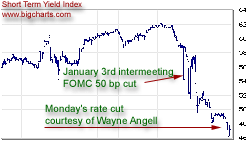 |
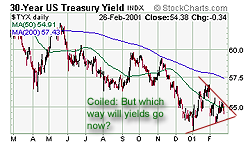 |
| Short
Term Yield Index 6-months |
30-year
US Treasury Yield Index 1-year |
Our
well paid, broadly respected, and infinitely capitalized
bond market shepherds, and I am thinking specifically
of PIMCO's Bill Gross here, maintain that interest rates
are going to go to 3%. In order to make a call like that,
you need to have a brutal conviction that the dollar will
hold up. Yet, nowhere in his entire argument does he discuss
the impact on the dollar of an interest rate cut to 3%.
But I see that productivity works for him because he has
more time to spend on TV than he does reading a basic
book on monetary analysis.
Look
here, if monetary policy becomes ineffective in promoting
the now customarily expected high rates
of return on US dollar-denominated investment, and we're
not talking about long-term foreign direct investment
either, then the inflation which he, and many other regal
analysts including the fist pounding wonder-kid at the
Economic Cycle Research Institute, do not see, will become
quickly visible.
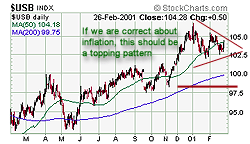 |
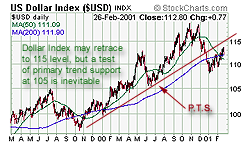 |
| 30
Year US Treasury Index 1-year |
US Dollar Index 3-years |
There cannot be deflation
in the United States
It's the truth. By definition, we are Inflationists, determined
to counter deflationary forces with more inflation. It
is as simple as that. I don't think that we could fit
more truth into a smaller sentence than that, unless you
can count the letter "V." The governors of our
credit money system might shout that the whole idea of
credit money is that the mechanism of credit best self
regulates the money supply against inflation… by canceling
both sides of the ledger during a contraction in the demand
for credit, the money supply should also contract, in
theory. In other words, if debts get cancelled, then so
do credits, and thus the money supply contracts rather
than expands.
Is
there a better way to explain the logic that underlies
our preoccupation with the deflationary aspects of a credit
cycle bust?
Yet,
our private sector banking system has rapidly erected,
and theoretically insured, a complex array of financial
intermediaries in order to rationalize the monetization
of those very credits, no doubt so that they can be used
more broadly, as money. But there is no need to go into
that here. Doug Noland writes on the topic every week
in the Credit-Bubble-Bulletin,
which we post at SafeHaven as a must read in order to
understand the rapidly changing developments in US and
global credit markets.
Thus,
over the past six years, foreign investors have been enormous
net buyers of this money, whose value is really only supported
in so far as their (foreign interests) own will desires
more dollar denominated CRAPITAL. Still, the point is
that the cancellation of credits now involves decisions
by foreign interests, and thus must impact on the exchange
rate of the dollar against other currencies. Unfortunately
for the dollar, since the United States is now the largest
global net debtor and since the global financial system
has monetized more US dollar-denominated debt than any
other foreign debt, the prospect for a massive inflationary
breakdown stemming from too many liquid (dollar) credits
ranks high, in our opinion.
Adding
to that problem of course is the fact that all the world's
paper currencies have been falling against the value of
important world commodities… we have passed the point
of no return, for to reverse this trend now would require
an interest rate hike, rather than a cut, by all the world's
central banks.
Global
Stock Market Deflation
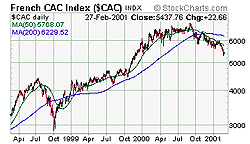 |
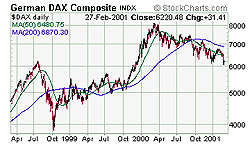 |
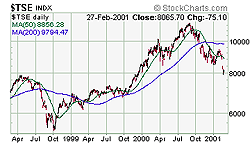 |
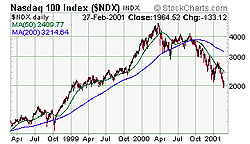 |
| French
CAC; German DAX; TSE 300 Composite; and Nasdaq 100:
3-years |
|
|
So
let us ask you, if the FOMC were to cut interest rates
by 150 basis points, which stocks would you buy under
such conditions, if you had to buy stocks? Why not start
with Monday's best performers, since they are the ones
that responded to the rate cut. In this case, the XAU
also happens to be February's best performing stock sector:
|
|
|
February's
Best Performers
|
| Gold |
13%
|
| Chemicals |
6%
|
| Hospitals |
6%
|
| Utilities |
4%
|
|
|
XAU:
American Gold Share Index
|
What
stocks wouldn't you buy?
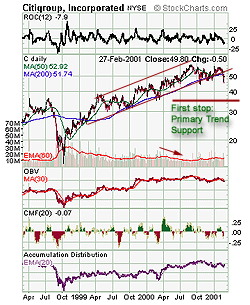 |
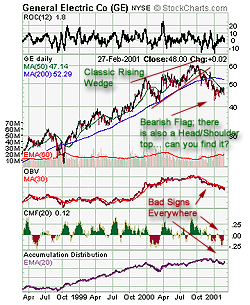 |
| Citigroup
common stock: 3 years |
General
Electric common: 3 years |
This
week (or maybe next) we are looking for…
-
Gold markets to roll over the shorts on improving technicals
- The
Dow to crystallize our call to break 9000, likely to
be led by the financials and a failure of the Transports
to follow through… C'mon boys, get it over with already
- The
long bond to break out of its holding pattern, on the
downside
- A
break in the Dollar, against both the Yen and Euro.
A
Note to Applegate at Lehman Brothers: You will get these
outcomes before a 150-basis point cut in the fed funds
rate… and we're gonna bet on it!
,
ClickHere.
Sincerely,
Edmond J. Bugos
The GoldenBar Global Investment Climate is not
a registered advisory service and does not give investment
advice. Our comments are an expression of opinion only
and should not be construed in any manner whatsoever as
recommendations to buy or sell a stock, option, future,
bond, commodity or any other financial instrument at any
time. While we believe our statements to be true, they
always depend on the reliability of our own credible sources.
Of course, we recommend that you consult with a qualified
investment advisor, one licensed by appropriate regulatory
agencies in your legal jurisdiction, before making any
investment decisions, and barring that, we encourage you
toconfirm the facts on your own before making important
investment commitments.